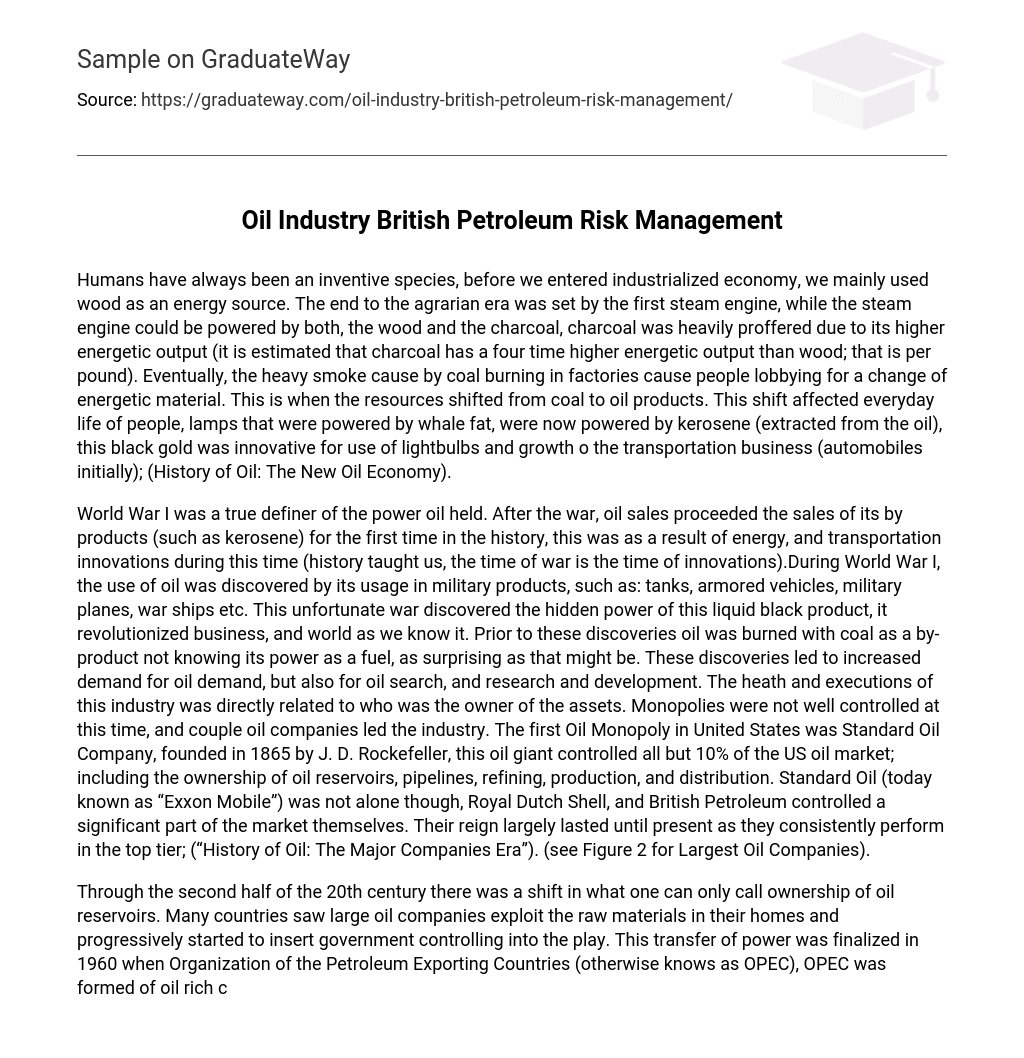Humans have always been an inventive species, before we entered industrialized economy, we mainly used wood as an energy source. The end to the agrarian era was set by the first steam engine, while the steam engine could be powered by both, the wood and the charcoal, charcoal was heavily proffered due to its higher energetic output (it is estimated that charcoal has a four time higher energetic output than wood; that is per pound). Eventually, the heavy smoke cause by coal burning in factories cause people lobbying for a change of energetic material. This is when the resources shifted from coal to oil products. This shift affected everyday life of people, lamps that were powered by whale fat, were now powered by kerosene (extracted from the oil), this black gold was innovative for use of lightbulbs and growth o the transportation business (automobiles initially); (History of Oil: The New Oil Economy).
World War I was a true definer of the power oil held. After the war, oil sales proceeded the sales of its by products (such as kerosene) for the first time in the history, this was as a result of energy, and transportation innovations during this time (history taught us, the time of war is the time of innovations).During World War I, the use of oil was discovered by its usage in military products, such as: tanks, armored vehicles, military planes, war ships etc. This unfortunate war discovered the hidden power of this liquid black product, it revolutionized business, and world as we know it. Prior to these discoveries oil was burned with coal as a by-product not knowing its power as a fuel, as surprising as that might be. These discoveries led to increased demand for oil demand, but also for oil search, and research and development. The heath and executions of this industry was directly related to who was the owner of the assets. Monopolies were not well controlled at this time, and couple oil companies led the industry. The first Oil Monopoly in United States was Standard Oil Company, founded in 1865 by J. D. Rockefeller, this oil giant controlled all but 10% of the US oil market; including the ownership of oil reservoirs, pipelines, refining, production, and distribution. Standard Oil (today known as “Exxon Mobile”) was not alone though, Royal Dutch Shell, and British Petroleum controlled a significant part of the market themselves. Their reign largely lasted until present as they consistently perform in the top tier; (“History of Oil: The Major Companies Era”). (see Figure 2 for Largest Oil Companies).
Through the second half of the 20th century there was a shift in what one can only call ownership of oil reservoirs. Many countries saw large oil companies exploit the raw materials in their homes and progressively started to insert government controlling into the play. This transfer of power was finalized in 1960 when Organization of the Petroleum Exporting Countries (otherwise knows as OPEC), OPEC was formed of oil rich countries such as Kuwait, Venezuela, Iran, Iraq, Kuwait, and Saudi Arabia, the purpose of this organization was to regulate, and mediate oil prices, production, and further oil companies’ rights. Even though this organization had little effect at the beginning, it was a clear shift from oil consuming countries to oil producing countries. Progressively some of these countries took over most of their oil reservoirs and formed National Oil Companies. Examples of these countries include Russia which controls their oil operations through state-regulated Gazprom, and Venezuela which has a strict control over their National Oil Company PDVSA (“History of Oil: The OPEC Era” & “History of Oil: The National Oil Company Era”). (see Figure 3 for biggest oil Producers by country & Figure 4 for Largest Oil reserves by country).
British Petroleum is one of the front runners when comparing Oil Companies. British Petroleum reported increasing revenues the past three years $298 Billion, $240 Billion, and $183 Billion in 2018, 2017, 2016 respectively. These gains came after stressful year in 2015 when they reported a loss of over $6 Billion which came after a very slow year in 2014 when they netted only $3.8 Billion. After 2015 financials were released, former Chairman of BP Carl-Henric Svanberg (from 2010-2018) offered following Chairman’s Letter:
“Oil prices have remained low, falling by more than 50% and our industry finds itself in a position not seen for some 30 years. This sustained low price is a result, not of lack of demand, but of oversupply. However, our work in reconfiguring BP following the incident in the Gulf of Mexico has meant that we were prepared and well positioned to respond to this volatile environment as we move through 2016” (Chairman’s Letter, Annual Report and Form 20-F 2015 pg. 6)
This year creates significance when comparing their situation to other oil companies, in 2014 Exxon reported an income of $16 Billion, and Chevron which reported a gain of $4 Billion; it is clear that both companies outperformed British Petroleum, but they did not have to face unfortunate obstacles they did. While all oil companies suffered from large growth in supply which drove the oil price down, British Petroleum was facing consequence by the infamous BP Deep Water Horizon oil spill which costed BP Billions of dollars in damages (ecological, and economical). Considering there were companies that were ruined by scandals such as Enron which after its fraudulent financial activities, and Pacific Gas & Electric Co. which went bankrupt after the California Electricity Crisis, British Petroleum did a great job reminiscing the fallen pieces in an effort to rebuild the brand, profits, and not letting their investors. (Chevron 2015 Annual Report, Exxon 2015 Annual Report, British Petroleum 2015 and 2018 Annual Report).





